LOVE THAT GOES BUMP IN THE NIGHT
Conor McPherson’s plays are so rooted in the characters that plot is really revelation. With unforced warmth, he captures loneliness in the act of self-effacement, and love as the best way to prove we’re really here. Geffen Playhouse’s offering The Night Alive is no nocturne’”much in the vein of McPherson’s countryman Martin McDonagh, these self-inventing characters, blessed with more hope than brains, are humorous but within a gritty context. If you allow yourself, you can walk inside this play.
Be forewarned, however, that you must be OK with the fact that McPherson is not in the business of spelling things out for you. Expect a Rashomon effect from this spectral American Buffalo in Dublin. The big talk after opening night was the play’s subjective upshot: What does it all mean? What, if anything, do these characters and their situation represent? Written in the Irish playwright’s typical metaphysical fashion, we’re not sure what to take away from this tale of downtrodden but strangely hopeful souls. His writing isn’t particularly literate or poetic, but I found this 100-minute story of a very unlikely affinity quite engaging as it alluringly expands the definition of love. It’s a wise and graceful play that’s always in the present tense, doesn’t try to explain too much, and considerately lets us imagine all the backstories necessary to fully embrace what the author has to share. In addition, the all-Irish ensemble’”offering surprisingly intelligible dialects’”is a master class in acting.
The evening is sweetly shaped by Randall Arney on Takeshi Kata’s wonderfully detailed, forced-perspective, dioramic cutaway set of a dilapidated Georgian manse near Dublin’s Phoenix Park. Sad-faced survivor Tommy (Paul Vincent O’Connor) is a marginal man, separated from his wife and not all that attached to his teenage kids. Tommy is content to plod through life with the occasional Guinness at the corner pub or play-fighting with Maurice, the upstairs landlord who raised Tommy when he needed a father figure. The twinkling and fuming Denis Arndt, as Maurice, offers one of my favorite performances in years.
Much like the improbable friendship in Of Mice and Men, Tommy’s dependent chum is slow-witted, ever-dreaming Doc (winsome and compelling Dan Donohue), a strange soul who seems to be defined by his dreams. Ever ready to bail out a buddy with an odd job or ten, Tommy assists this needy, impecunious loper with funding and pep talks for Doc’s itinerant cigar sales and whatever other stay-poor-schemes he fantasizes.
So it’s not surprising that Tommy befriends a young girl named Aimee (smoky-throated Fiona O’Shaughnessy, conveying a survivor’s strength and all the vulnerability of the seemingly hopeless). He rescues her from a supposed boyfriend who nearly broke her nose. With reflexive kindness, Irish hospitality, and no expectation of reward, he takes in this surrogate daughter when he learns she’s homeless.
And it wouldn’t be a McPherson play without a touch of evil. Any accidental or predestined happiness that the characters stumble upon is very much put in play by the arrival of wolf-at-the-door Kenneth (threatening Peter O’Meara, who rightly does not go over the top).
Commendably, Arney’s confident direction manages to balance the pluses in the plot against the fearsome dread that invades this “night alive,” a night in which the flip side is dreaming. Equally marvelous is how this one-act captivates its audience ’”even with its head-scratching subjectivity and final scene which seems tagged on to promote a sort of quantum-physics deus ex machina (I also found David Kay Mickelsen’s jazzy NPR-style interlude music inconsonant to the proceedings).
What gleams here, as it did in Shining City, The Weir, and The Seafarer, is McPherson’s depiction of a kind of dynamic decency. This kindness from strangers all but stalks the play. And it’s no passive benevolence but the kind of kneejerk goodness that makes Tommy a troubled treasure who you believe from start to end. I love how McPherson tests his unsuspecting saints while simultaneously suggesting that no deed’”evil or otherwise’”goes unpunished.
The Night Alive
Gil Cates Theater
Geffen Playhouse, 10886 Le Conte Ave
ends on March 15, 2014
for tickets, call 310.208.5454
or visit www.GeffenPlayhouse.com
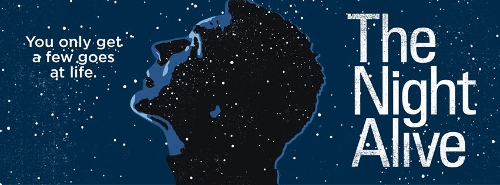
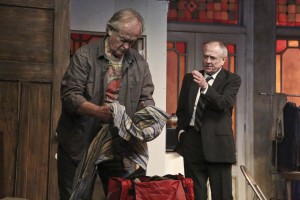
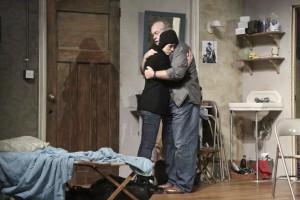
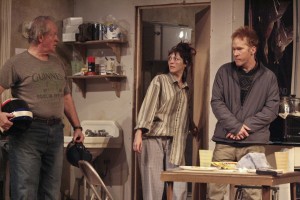
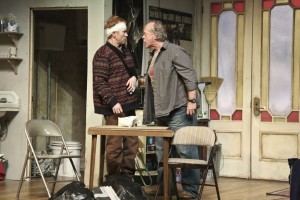
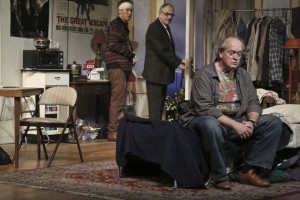
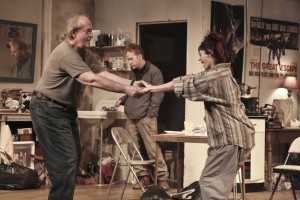
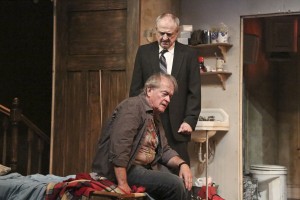
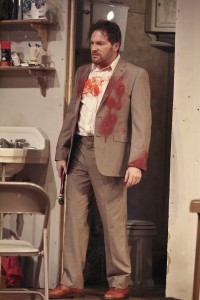

{ 1 comment… read it below or add one }
Don’t waste your money. A fragmented play with “lovable losers” and little plot and a dissolute theme about friendship or fate or whatever, the play is an excruciating 100 minutes of Irish blarney — the kind of drunken pub declamations that are, thankfully forgotten the next morning. The “drama” builds to nothing except, possibly, a kind of dramatization of the most dimwitted character’s final observation about black holes and time, of all things. This play and The Weir, a better but still unremarkable play, are proof contemporary English-language theater is starved for real drama, so much so that this plotless prattle has endeared so many.